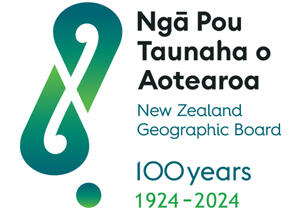Official place names are names we have formally agreed to.
Recorded place names are names shown on maps and charts but which we have not formally agreed to, so they are not official.
Dual place names are two names for a place or feature from different languages with equal significance. Dual place names are usually in te reo Māori and another language. They are used together as one name, such as Maungakiekie / One Tree Hill. Usually the Māori name is first to reflect first naming.
Alternative place names are two or more official names for the same place or feature with equal significance, usually in te reo Māori and another language. They can be used separately or together, such as Maunga Kākaramea or Rainbow Mountain. We suggest using ‘or’ when showing alternative names together.
Collected place names are unofficial original Māori names for places that usually have another name, and that we have not formally agreed to. This means that they are not official. Historical layers of occupation may mean there are several collected names.
What we don’t name
Streets and roads
Local councils name streets and roads.
State highways
Waka Kotahi New Zealand Transport Agency names state highways.
The name of New Zealand
Our own Act specifically excludes us from naming New Zealand. An Act of Parliament would be needed to change the name of New Zealand.
Homesteads, buildings or businesses
We do not name homesteads. The Companies Office is responsible for reserving and registering company and business names.
Council reserves
Local councils name reserves under their control.
